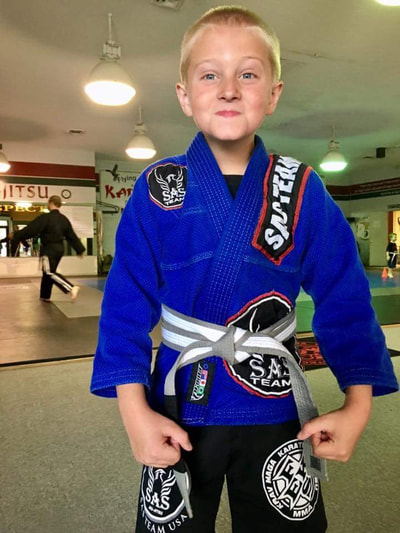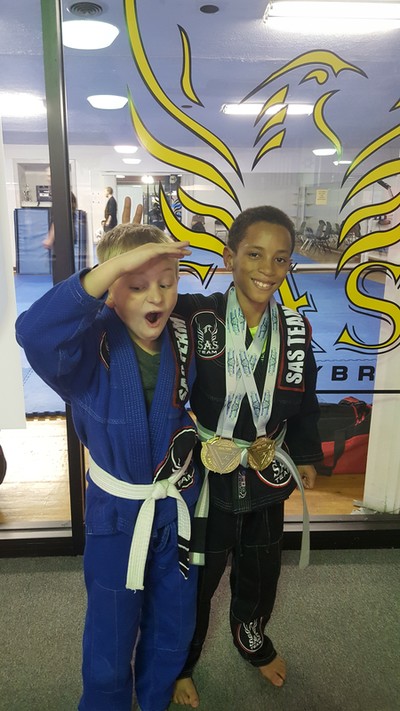Our Kids’ Brazilian Jiu Jitsu class helps teach children valuable self-defense skills along with important lessons about goal-setting, teamwork, and body coordination. This fun and dynamic classes mixes grappling techniques with jiu-jitsu and body control games. Students learn how to protect themselves from bullies and how to protect themselves if knocked to the ground.
FEATURING
WHAT IS BRAZILIAN JIU-JITSU
Brazilian Jiu-Jitsu is a martial art, sport and self-defense system that emphasizes getting an opponent to the ground in order to use ground fighting techniques and submission holds involving positional control, joint-locks, and chokeholds. Today, professional self-defense training courses throughout the world, such as the U.S. Army’s Modern Army Combative program, include some components of Brazilian Jiu-Jitsu.
In this martial art, a smaller and weaker person can successfully defend his or herself from a larger and stronger opponent through using the proper technique and leverage. Once two fighters are on the ground, physical strength can be offset or enhanced by an experienced grappler who knows how to use mechanical advantage instead of brute strength. While other combat sports like wrestling and Judo traditionally use a takedown to bring an opponent to the ground, Jiu-Jitsu permits a wide variety of techniques and moves to bring the fight to the ground after taking a grip on the opponent.
Why Should Kids Learn Jiu-Jitsu?
Brazilian Jiu-Jitsu is known as the perfect martial art for children because it is a non-striking self-defense martial art system that steers children away from using brute strength and toward using their minds. This martial art style is considered to be one of the best self-defenses for kids and adults since it is applied in response to physical aggression, which will not lead to violence. The sport is also designed so that a smaller and weaker person or child can use leverage to defend him or herself against a larger and strong opponent.
Through learning Jiu-Jitsu, children will become more physically fit, and they will learn and develop skills that they can put to use off of the mat throughout their entire lives. Children practicing Jiu-Jitsu are expected to treat each other and their instructors with respect. This then creates a positive and respectful environment that demonstrates to the trainees the rewards that come with being courteous and respectful.
FEATURING
- Valuable Self-Defense Training
- Helps Build Confidence
- No Previous Experience Needed
WHAT IS BRAZILIAN JIU-JITSU
Brazilian Jiu-Jitsu is a martial art, sport and self-defense system that emphasizes getting an opponent to the ground in order to use ground fighting techniques and submission holds involving positional control, joint-locks, and chokeholds. Today, professional self-defense training courses throughout the world, such as the U.S. Army’s Modern Army Combative program, include some components of Brazilian Jiu-Jitsu.
In this martial art, a smaller and weaker person can successfully defend his or herself from a larger and stronger opponent through using the proper technique and leverage. Once two fighters are on the ground, physical strength can be offset or enhanced by an experienced grappler who knows how to use mechanical advantage instead of brute strength. While other combat sports like wrestling and Judo traditionally use a takedown to bring an opponent to the ground, Jiu-Jitsu permits a wide variety of techniques and moves to bring the fight to the ground after taking a grip on the opponent.
Why Should Kids Learn Jiu-Jitsu?
Brazilian Jiu-Jitsu is known as the perfect martial art for children because it is a non-striking self-defense martial art system that steers children away from using brute strength and toward using their minds. This martial art style is considered to be one of the best self-defenses for kids and adults since it is applied in response to physical aggression, which will not lead to violence. The sport is also designed so that a smaller and weaker person or child can use leverage to defend him or herself against a larger and strong opponent.
Through learning Jiu-Jitsu, children will become more physically fit, and they will learn and develop skills that they can put to use off of the mat throughout their entire lives. Children practicing Jiu-Jitsu are expected to treat each other and their instructors with respect. This then creates a positive and respectful environment that demonstrates to the trainees the rewards that come with being courteous and respectful.

